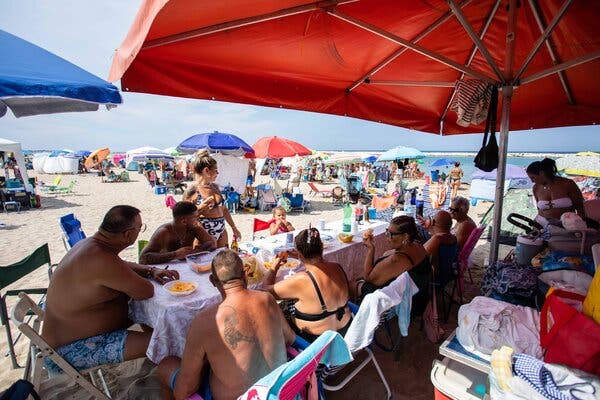For those who feel priced out of expensive, privatized seaside clubs in Italy, elaborate lunch spreads feel like the last bastion of good spirits.
Listen to this article · 7:05 min Learn more
Reporting from Bari, Italy
At 1 p.m. at the San Girolamo beach in Italy’s southern city of Bari, as the sun reached its summit and temperatures came close to 100 degrees, the smell of fried green peppers made its way through a thick maze of umbrellas and folding chairs.
On plastic tables, decks of playing cards and crossword puzzles were replaced by cotton tablecloths, and loud shouts summoned the children for lunch. Aluminium trays of lasagna, rice with mussels and potatoes, seafood pasta, raw octopus and fried sausages were all served, as part of a longstanding Italian tradition of feasting on the beach.
“When it’s too hot we make vegetables,” said Grazia De Giosa, 61, who had prepared a three-course meal for her extended family. “Like parmigiana.”
But over the last couple of summers, the beloved ritual has become a source of tension. Locals have noticed that a growing number of beach clubs on the Apulian coast around Bari, a stronghold of seaside picnics, have started banning people from coming in with food.
“On a private beach, it’s not nice to see these banquets,” said Erika Scarimbolo, 23, a bar waitress at the Adria 3.0 beach club in San Girolamo, one of many businesses that have sprung up in recent years with the region’s booming tourism trade. “An owner sometimes needs a little decorum.”
Thank you for your patience while we verify access.
